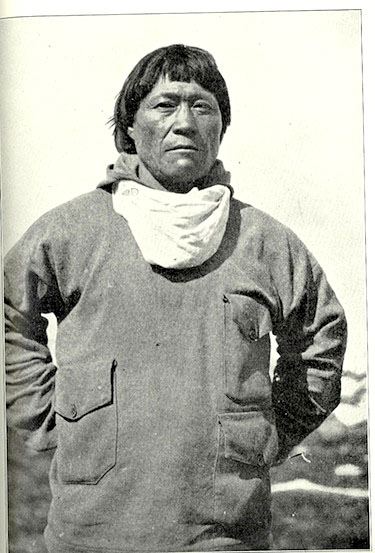Taissumani: April 26
Igjugaarjuk Becomes a Shaman, Part 2

Igjugaarjuk said “true wisdom is only to be found far away from people, out in the great solitude, and it is not found in play but only through suffering.” (FILE PHOTO)
The beliefs of the inland Inuit in the Kivalliq, the so-called Caribou Eskimos, were quite different than those of the sea-coast.
For the inland dwellers, the mistress of the animals of the hunt was not a woman at the bottom of the sea, but rather a woman, Pinga, living somewhere up in the air or the sky. Whereas the Inuit of the coast believed that a shaman could summon seals by placating the woman of the sea, the inland Inuit believed that the animals had definite laws for their own wanderings, laws with which no shaman could interfere.
Igjugaarjuk, a shaman, believed that true wisdom could only be attained “through sufferings in solitude of almost sublime simplicity.”
After Igjugaarjuk had endured the time of privation on the land which prepared him for his role as a shaman, his teacher, Perqannaaq, came to fetch him “when a new moon was lighted and had the same size as the one that had shone for us when we left the village.”
The older man hauled him home on his sled, for the newly trained shaman was too weak to stand. He had slowly to be nursed back to health.
Igjugaarjuk resumes his story:
“Later, when I had become quite myself again, I understood that I had become the shaman of my village, and it did happen that my neighbours or people from a long distance away called me to heal a sick person, or to inspect a course if they were going to travel. When this happened, the people of my village were called together and I told them what I had been asked to do. Then I left tent or snowhouse and went out into solitude: ahiarmut, away from the dwellings of man…
“If anything difficult had to be found out, my solitude had to extend over three days and two nights, or three nights and two days. In all that time I had to wander about without rest, and only sit down once in a while on a stone or a snow drift. When I had been out long and had become tired, I could almost doze and dream what I had come out to find and about which I had been thinking all the time. Every morning, however, I could come home and report on what I had so far found, but as soon as I had spoken I had to return again, out into the open, out to places where I could be quite alone…
“These days of seeking for knowledge are very tiring, for one must walk all the time, no matter what the weather is like and only rest in short snatches. I am usually quite done up, tired, not only in body but also in head, when I have found what I sought.
“We shamans in the interior have no special spirit language, and believe that the real angakkut do not need it.”
Igjugaarjuk took a dim view of the practices of shamans on the sea coast. He told Knud Rasmussen:
“These angakkut never seemed trustworthy to me. It always appeared to me that these salt-water angakkut attached more weight to tricks that would astonish the audience, when they jumped about the floor and lisped all sorts of absurdities and lies in their so-called spirit language. To me all this seemed only amusing and as something that would impress the ignorant. A real shaman does not jump about the floor and do tricks, nor does he seek by the aid of darkness, by putting out the lamps, to make the minds of his neighbours uneasy.
“For myself, I do not think I know much, but I do not think that wisdom or knowledge about things that are hidden can be sought in that manner. True wisdom is only to be found far away from people, out in the great solitude, and it is not found in play but only through suffering. Solitude and suffering open the human mind, and therefore a shaman must seek his wisdom there.”
Taissumani recounts a specific event of historic interest. Kenn Harper is a historian, writer and linguist who lives in Iqaluit. Feedback? Send your comments and questions to kennharper@hotmail.com.




(0) Comments